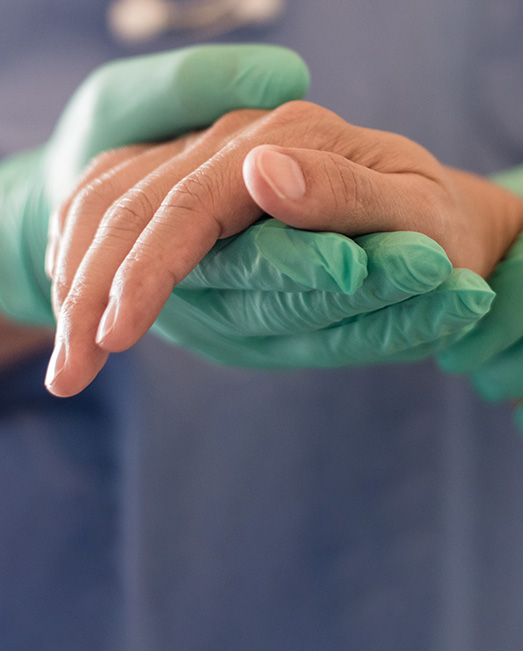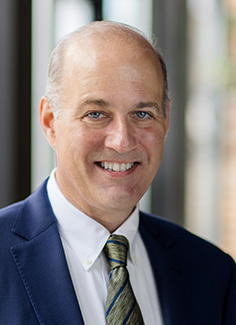Community
Copyright@ Australian Catholic University 1998-2026 | ABN 15 050 192 660 CRICOS registered provider: 00004G | PRV12008
Copyright@ Australian Catholic University 1998-2026 | ABN 15 050 192 660 CRICOS registered provider: 00004G | PRV12008

Over the past three decades, Dr Brian Kane has taught bioethics in light of Christian faith and Catholic teaching in healthcare to countless doctors and nurses. In that time, he has seen a dramatic shift in the cultural context these medical professionals work within.
“This cultural shift has challenged the authority that we, as a society, once gave to selected groups of people, including healthcare workers,” says Dr Kane, an ACU honorary fellow and Senior Director of Ethics for Catholic Health Association of the United States (CHA).
“Bioethicists, generally, see their role as one of advocacy. We suggest particular choices, of course. But our role is to accompany those in need.”
Dr Kane is the author of the influential book The Blessing of Life: An Introduction to Catholic Bioethics. The title invites a question: What is Catholic bioethics, and why is it important?
As other scholars have noted, healthcare workers need to be aware and mindful of the religious beliefs and values of a patient in their care. But how does Catholic moral thinking help these medical professionals to make sense of the ethical dilemmas they face at work?
Dr Kane says it’s about balancing theory and practice.
“All of us encounter ethical dilemmas as we live our lives,” he says. “We struggle to make sense of difficult decisions, both personally and professionally. Physicians and nurses know that theory is helpful, but it must be tested in practice. Catholic moral thinking, in my experience, balances both.”
In The Blessing of Life, Dr Kane notes that, in many ways, we have become numb to the influences of medical advances on our lives. “Several hundred years ago, most persons struggled to survive,” he writes. “Science has profoundly changed that circumstance.”
But while scientific knowledge has contributed so much to our society for the good of all, he cautions against separating it from other forms of knowledge.
“If science is separated from other kinds of knowledge about the human person, it will fail to see the full embodiment of personhood,” Dr Kane says. “I will add that the same is true of other fields that want to enhance our lives, including theology. Religious faith that does not include science blinds itself to the human experience.”
He believes that, as human persons, we need to reach out to each other with charity because of our common humanity.
This applies to physicians and nurses using their values and healthcare ethics to make sound judgments about their patients, and it also applies to those tackling broader, grander tasks, like breaking the cycle of health inequity.
“My view is that the Catholic social tradition has prophetically voiced the aspirational goals of social equity, of which health equity is a part,” Dr Kane says. “There has been progress toward those goals, but not completion of the task.”
If you ask Dr Kane the main thing the pandemic has highlighted in the field of healthcare, he’ll tell you that it has confirmed what we already knew: health inequity is deeply entrenched.
Minority groups have been disproportionally affected by the virus, he says, and the pandemic has simply exposed the longstanding drivers of this disparity.
“There is a social inequality with the distribution of healthcare that urgently needs to be addressed,” says Dr Kane, editor of Health Care Ethics USA.
“Health equity means to give each person what they need to achieve the health that they are able. [We] must reflect upon, and change, the ability for minority populations to have access to the healthcare that they need.”
Awareness of this disparity goes back decades. Despite the phenomenal capacity of medicine to diagnose, treat and cure disease, socioeconomically disadvantaged groups too often lack access to quality care.
As a healthcare ethicist who draws on Catholic social teaching, Dr Kane emphasises the importance of a cohesive society that cares for all those in need. He stresses the value of the human person in pursuing social justice in health — meaning that no healthcare system favours one group of people over another.
The Catholic social tradition has diagnosed our societal problems, he adds, and at the core, it comes down to “a failure to love”.
“We have competing economic systems — capitalism and socialism —which have common goals, but divergent processes. Catholic social thought cannot be reduced to either. Instead, it calls for a re-imagination of both [systems], to accomplish the goal of caring for our neighbour.”
Dr Kane points to a growing global divisiveness, which reflects these “different political approaches to our common challenge of caring for persons”.
“At the extremes, there are emphases on either the good of the community, or the autonomy of the individual,” he says. “I think that both the community and the person need to be mediated in any social policy.”
Achieving health equity demands that world leaders address “a loss of who we are as persons, in relation to each other, and to God”.
It is more than just a crisis of distribution, it is “a modern identity crisis that has forsaken both God and neighbour”.
“Distribution isn’t ‘value free’. Building effective networks of care means that ethical choices are made about how to care for others,” Dr Kane says.
“How should we care? How do we meet the needs of those who we serve? How do we give in order to create a better society for those whom we serve? Health inequity is not a ‘supply’ issue, but rather a social failure to value every member of our society.”
Dr Brian Kane will deliver the inaugural lecture in the Aquero Lecture Series on the topic of achieving health equity and cohesion in a divided world. The lecture is a free event, and will be livestreamed.
Keen to learn about healthcare ethics at ACU? Explore the options.

Copyright@ Australian Catholic University 1998-2026 | ABN 15 050 192 660 CRICOS registered provider: 00004G | PRV12008